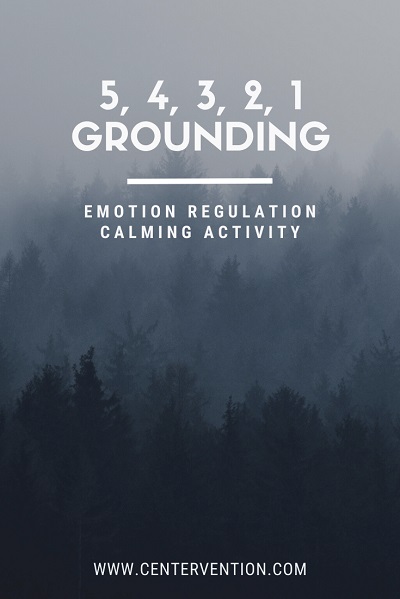These emotional regulation worksheets will help your students focus on the present by using their five senses.
To often, when we’re anxious, stressed, or otherwise upset, we are often thinking about the past or future. We’re worried about all the things that could possibly go wrong in the future, or we’re dwelling on a past incident and all the things that did go wrong.
5, 4, 3, 2, 1 grounding is a calming technique that helps you focus on the present by using your five senses and to notice things currently around you. This brings you back to the present rather than overthinking the past or future.

Emotional Regulation Worksheets Directions
To start, students should take a deep breath. In, and out.
5 Things You See: Use your eyes to look around. Write five things you see on the worksheet. You could say things like “I see a lamp, a water bottle, a box of tissues, a poster on the wall, and a computer.
4 Things You Feel: This uses your sense of touch. Don’t think about feelings like sad or mad, think about things you can feel with your hands or other parts of your body. For example, you could list the fuzzy liner of your sweatshirt on your arms, your hair falling onto your face, the cool breeze on your skin, or a mosquito bite itching.
3 Things You Hear: Listen carefully. What sounds do you hear? If you’re at school, you might hear pencils scratching on paper. If you’re outside, you might hear wind rustling the leaves in the trees. If you’re at home, you might hear the TV playing in the other room.
2 Things You Smell: Take another deep breath in with your nose. This one can be tough because there aren’t always smelly things around. You might be able to notice the smell of hand sanitizer someone just used, or maybe your teacher is wearing perfume. If you can’t notice any smells, write down your favorite things to smell, like freshly baked cookies or outside after it rains.
1 Thing You Taste: Move your tongue around in your mouth if you need to. Is your mouth still minty from brushing your teeth? Or can you still taste the peanut butter you had at lunch? If you can’t taste anything, or if you have a bad taste in your mouth, write down your favorite thing to taste.
Once you’ve finished, take another deep breath.
Students should feel a lot more calm than they did when they started. However, if these emotional regulation worksheets don’t help, and they’re still feeling stressed or upset, you could have them take another deep breath and go through the lists again, trying to think of different things they see, feel, hear, smell, and taste. Or, have them try another coping strategy that may work better in this situation.
Additional Resources
Books
- Wilma Jean – The Worry Machine by Julia Cook
- Not-So-Brave Penguin by Steve Smallman
- Worry Says What? by Allison Edwards
- Saturday Is Swimming Day by Hyewon Yum
- Talk About The Monster by Mistofer Christopher
- When I Feel Scared by Cornelia Maude Spelman